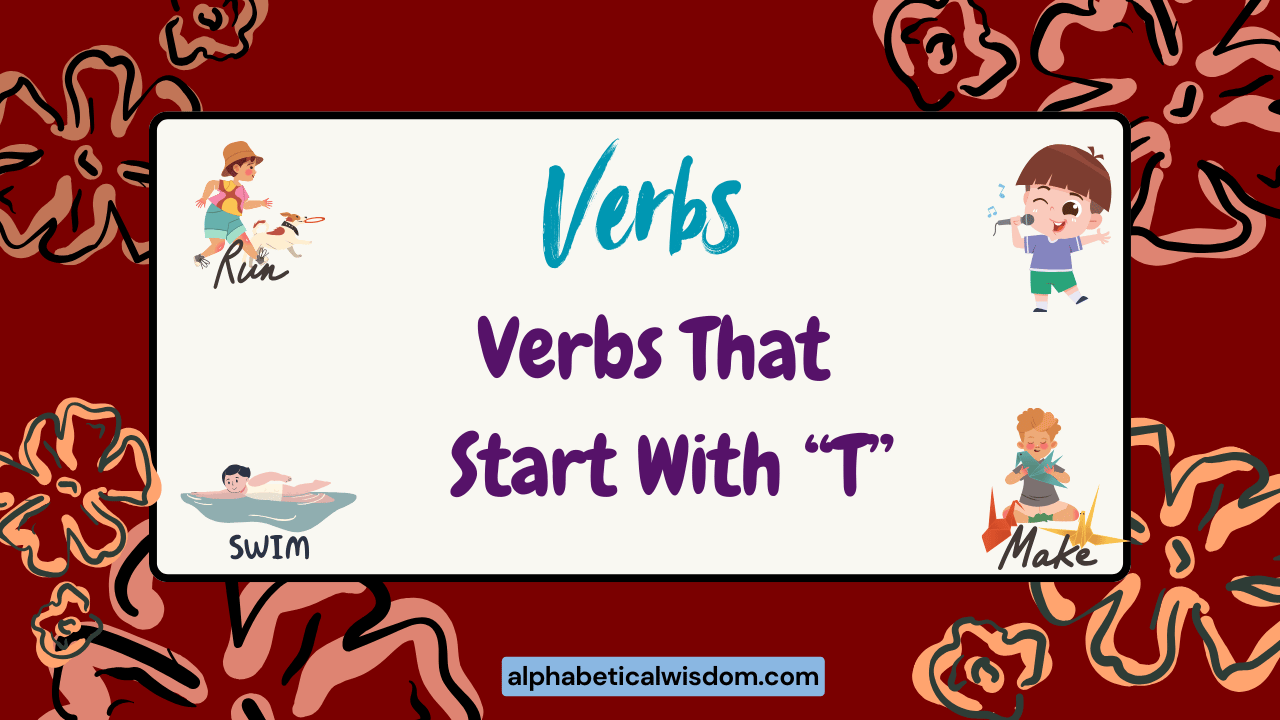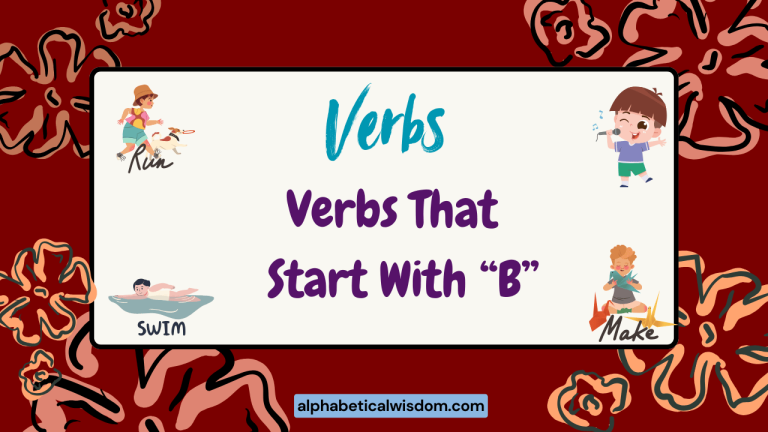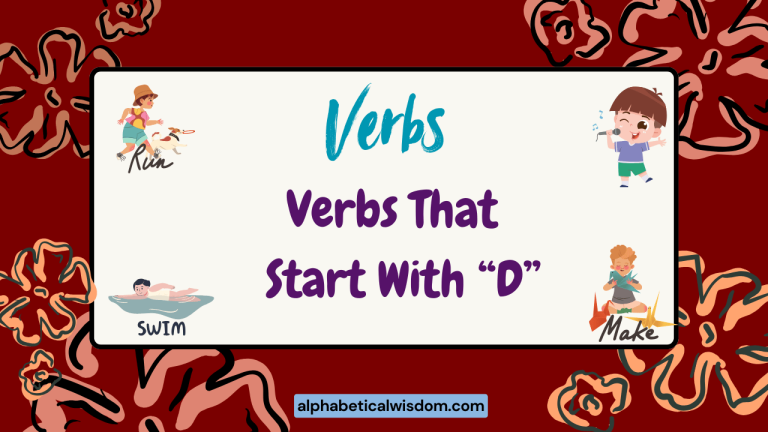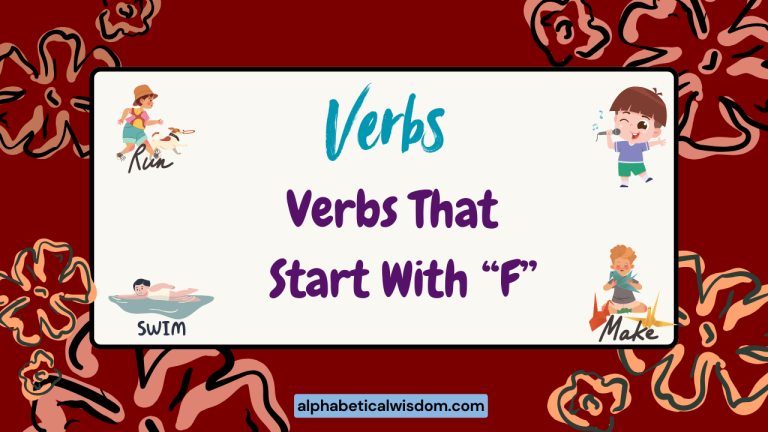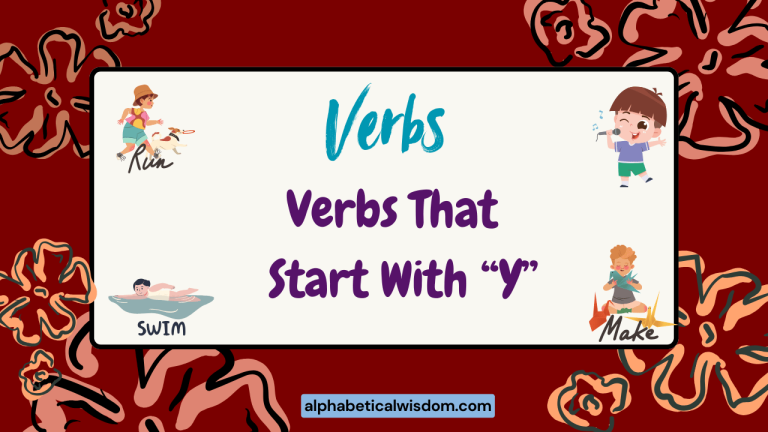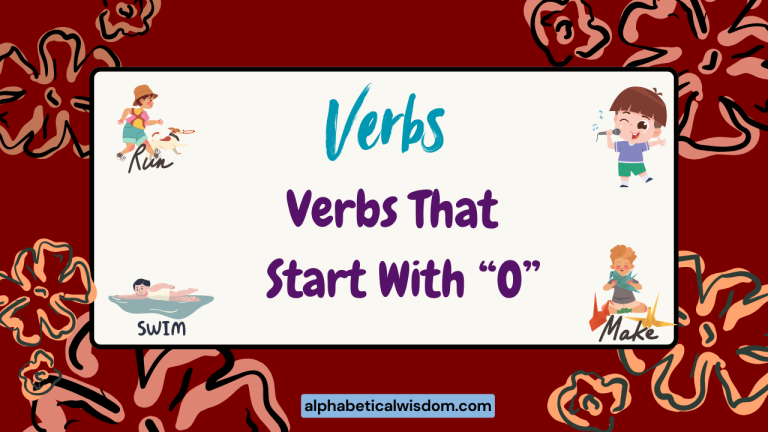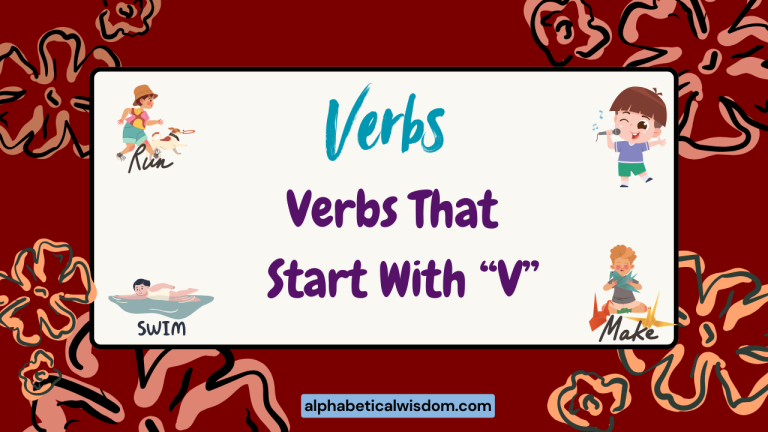Verbs That Start With T: A Comprehensive Grammar Guide
Verbs are the action words of the English language, forming the backbone of sentences and conveying a wide range of meanings. Mastering verbs, especially those starting with specific letters, can significantly enhance your vocabulary and improve your ability to express yourself clearly and accurately.
This article focuses on verbs that begin with the letter “T,” exploring their definitions, usage, and providing numerous examples to solidify your understanding. Whether you’re a student, a teacher, or simply an English enthusiast, this guide will offer valuable insights and practical exercises to help you confidently use “T” verbs in your writing and speaking.
Table of Contents
- Introduction
- Definition of Verbs Starting With T
- Structural Elements of Verbs Starting With T
- Types and Categories of Verbs Starting With T
- Examples of Verbs Starting With T
- Usage Rules for Verbs Starting With T
- Common Mistakes With Verbs Starting With T
- Practice Exercises
- Advanced Topics
- FAQ
- Conclusion
Definition of Verbs Starting With T
Verbs starting with the letter “T” encompass a wide array of actions, states, and occurrences. These verbs, like all verbs, are crucial components of sentences, indicating what the subject is doing, being, or experiencing.
They can be classified based on their function (action, linking, auxiliary), transitivity (transitive, intransitive), and form (regular, irregular). Understanding these classifications is essential for using “T” verbs correctly and effectively in various contexts.
Verbs, in general, serve as the predicate of a sentence or clause. They express actions (run, jump), occurrences (happen, become), or states of being (is, seems). Verbs starting with “T” are no different, offering a diverse range of meanings from simple actions like “talk” and “touch” to more complex concepts like “transform” and “transcend.” The proper use of these verbs can significantly enhance the clarity and impact of your communication.
Structural Elements of Verbs Starting With T
The structural elements of verbs starting with “T” are consistent with those of all English verbs. They can be conjugated to indicate tense (past, present, future), aspect (simple, continuous, perfect, perfect continuous), mood (indicative, imperative, subjunctive), and voice (active, passive).
Understanding these elements allows you to manipulate verbs to express precise meanings and nuances.
Consider the verb “to talk.” Its structural elements can be illustrated as follows:
- Base Form: talk
- Past Simple: talked
- Past Participle: talked
- Present Participle: talking
- Third-Person Singular Present: talks
These forms are created by applying standard English verb conjugation rules. However, some verbs starting with “T” are irregular, meaning their past simple and past participle forms do not follow the standard “-ed” ending.
For example, “tear” becomes “tore” and “torn.”
Types and Categories of Verbs Starting With T
Verbs starting with “T” can be categorized into several types based on their function and how they interact with other elements in a sentence. The main categories include transitive, intransitive, auxiliary, and phrasal verbs.
Transitive Verbs
Transitive verbs require a direct object to complete their meaning. The action of the verb is transferred to the object. For example, in the sentence “She tossed the ball,” “tossed” is a transitive verb and “the ball” is the direct object.
Intransitive Verbs
Intransitive verbs do not require a direct object. The action of the verb is complete in itself. For example, in the sentence “The baby trembled,” “trembled” is an intransitive verb.
Auxiliary Verbs
Auxiliary verbs (also known as helping verbs) are used with a main verb to form verb phrases. They help to indicate tense, mood, or voice. While “to be,” “to have,” and “to do” are the most common auxiliary verbs, verbs starting with “T” can sometimes function as auxiliaries in specific constructions. For example, “tend to” can act as an auxiliary to indicate a habitual action.
Phrasal Verbs
Phrasal verbs consist of a verb combined with a preposition or adverb (or both), creating a new meaning that is different from the original verb. For example, “take off” means to remove (clothing) or to depart (an aircraft). Many phrasal verbs start with “T,” such as “turn on,” “take over,” and “try out.”
Examples of Verbs Starting With T
The following sections provide extensive examples of verbs starting with “T,” organized by their category. Each table includes a variety of examples to illustrate their usage in different contexts.
Transitive Verb Examples
Here are some examples of transitive verbs that begin with the letter “T.” Transitive verbs, by definition, require a direct object to complete their meaning. Notice how each verb in the table below is followed by an object that receives the action.
| Verb | Example Sentence |
|---|---|
| Take | She took the book from the shelf. |
| Teach | The professor teaches history. |
| Tell | He told her a secret. |
| Thank | I thank you for your help. |
| Think | She thinks about her future. |
| Throw | The pitcher threw the ball. |
| Tie | He tied his shoelaces. |
| Tip | They tipped the waiter generously. |
| Toss | He tossed the keys to his friend. |
| Touch | She gently touched his hand. |
| Track | The hunters tracked the deer through the forest. |
| Trade | The companies traded stocks on the exchange. |
| Train | The coach trains the athletes rigorously. |
| Transfer | The bank transferred the funds to her account. |
| Transform | The artist transformed the old barn into a studio. |
| Translate | She translated the book from French to English. |
| Transport | The trucks transport goods across the country. |
| Trap | The police trapped the suspect in the building. |
| Treat | The doctor treated the patient with care. |
| Trim | He trimmed the hedges in the garden. |
| Trust | I trust his judgment completely. |
| Try | She tried her best on the exam. |
| Tame | The lion tamer tamed the wild beast. |
| Taste | The chef tasted the soup before serving it. |
| Test | The scientists tested the new vaccine. |
| Tidy | She tidied her room before the guests arrived. |
| Tolerate | I cannot tolerate such behavior. |
| Tackle | The football player tackled his opponent. |
Intransitive Verb Examples
Here are examples of intransitive verbs starting with “T.” Intransitive verbs do not take a direct object; the action is complete within the verb itself. Notice how these verbs are not followed by a noun or pronoun receiving the action.
| Verb | Example Sentence |
|---|---|
| Talk | They talked for hours. |
| Tremble | The ground trembled during the earthquake. |
| Thrive | Plants thrive in sunlight. |
| Travel | We travel frequently for work. |
| Tire | I tire easily in the heat. |
| Teem | The lake teems with fish. |
| Think | I think therefore I am. |
| Tumble | The acrobat tumbled across the stage. |
| Transpire | The meeting transpired without any issues. |
| Tarry | Do not tarry, we must leave now. |
| Testify | He testified in court. |
| Thank | She thanked God for her blessings. |
| Tiptoe | The cat tiptoed silently across the floor. |
| Toll | The bell tolled solemnly. |
| Toil | Farmers toil in the fields all day. |
| Trickle | Water trickled down the rocks. |
| Triumph | Good will always triumph over evil. |
| Trouble | I don’t want to trouble you with my problems. |
| Trust | You have to trust in yourself. |
| Try | One must always try to do their best. |
| Throb | My head throbbed with pain. |
| Tingle | My fingers tingle in the cold. |
| Thaw | The snow began to thaw in the spring sunshine. |
| Tingle | My skin tingled after my walk in the sun. |
| Tip | The scale tipped slightly to the left. |
| Tolerate | I cannot tolerate such rudeness any longer. |
| Tumble | The old building started to tumble. |
Auxiliary Verb Examples
While less common, some verbs starting with “T” can function as auxiliary verbs, primarily in specific idiomatic expressions. These expressions often involve the verb “to” followed by another verb.
The table below illustrates such cases.
| Verb | Example Sentence |
|---|---|
| Tend to | He tends to arrive late. |
| Try to | We try to help those in need. |
| Threaten to | The storm threatened to worsen overnight. |
| Trouble to | Don’t trouble to call him; he won’t answer. |
| Turn to | They turned to prayer in their hour of need. |
| Take to | She took to painting as a hobby. |
Phrasal Verb Examples
Phrasal verbs are combinations of a verb and a preposition or adverb, creating a new meaning. Many common and useful phrasal verbs start with “T.” Understanding these verbs is crucial for fluent English.
| Verb | Meaning | Example Sentence |
|---|---|---|
| Take after | Resemble | He takes after his father in appearance. |
| Take away | Remove | Please take away the dishes. |
| Take back | Withdraw | I take back what I said. |
| Take down | Write down | Please take down these notes. |
| Take in | Deceive | Don’t be taken in by his lies. |
| Take off | Depart | The plane will take off soon. |
| Take on | Assume responsibility | She will take on the new project. |
| Take out | Remove | He took out the trash. |
| Take over | Assume control | The company was taken over by a larger firm. |
| Take up | Start a hobby | He took up painting in his retirement. |
| Tear down | Demolish | They tore down the old building. |
| Tear up | Rip into pieces | She tore up the letter in anger. |
| Tell off | Reprimand | The teacher told the student off for misbehaving. |
| Think over | Consider carefully | I need to think over your proposal. |
| Throw away | Discard | Please throw away the garbage. |
| Throw up | Vomit | He threw up after eating the spoiled food. |
| Touch on | Mention briefly | The speaker touched on several important issues. |
| Track down | Find after searching | The police tracked down the suspect. |
| Try on | Test clothing for size | She tried on the dress before buying it. |
| Try out | Test something to see if you like it | He tried out the new car. |
| Turn around | Change direction | The company managed to turn around its fortunes. |
| Turn down | Reject | She turned down the job offer. |
| Turn in | Submit | Please turn in your assignments on time. |
| Turn off | Switch off | Please turn off the lights when you leave. |
| Turn on | Switch on | She turned on the television. |
| Turn out | Appear or happen in a particular way | It turned out to be a beautiful day. |
| Turn up | Arrive unexpectedly | He turned up late for the meeting. |
| Tune in | Watch or listen to a broadcast | Don’t forget to tune in next week for the next episode. |
Usage Rules for Verbs Starting With T
Using verbs starting with “T” correctly involves adhering to standard English grammar rules, including tense agreement, subject-verb agreement, and understanding the irregularities of certain verbs.
Tense Agreement
Tense agreement requires that the verbs in a sentence or paragraph are consistent in tense, unless there is a logical reason to shift tenses. For example: “He talked about his trip, and I listened attentively.” Both verbs are in the past tense.
Subject-Verb Agreement
Subject-verb agreement requires that the verb agrees in number with its subject. Singular subjects take singular verbs, and plural subjects take plural verbs. For example: “She takes the bus to work” (singular) vs. “They take the bus to work” (plural).
Irregular Verbs
Many verbs starting with “T” are irregular, meaning their past simple and past participle forms do not follow the standard “-ed” ending. It is crucial to memorize these forms.
Some examples include:
- Tear: tore, torn
- Tell: told, told
- Think: thought, thought
The following table provides a more comprehensive list of irregular verbs starting with “T.”
| Base Form | Past Simple | Past Participle |
|---|---|---|
| Tear | Tore | Torn |
| Tell | Told | Told |
| Think | Thought | Thought |
Common Mistakes With Verbs Starting With T
Several common mistakes occur when using verbs starting with “T.” These errors often involve incorrect tense usage, subject-verb disagreement, or misuse of irregular verb forms.
| Incorrect | Correct | Explanation |
|---|---|---|
| He taked the book. | He took the book. | “Take” is irregular; the past simple is “took.” |
| She think it’s a good idea. | She thinks it’s a good idea. | Singular subject “she” requires the singular verb form “thinks.” |
| They was talking loudly. | They were talking loudly. | Plural subject “they” requires the plural verb form “were.” |
| I have teared the paper. | I have torn the paper. | “Tear” is irregular; the past participle is “torn.” |
| He telled me a story. | He told me a story. | “Tell” is irregular; the past simple is “told.” |
Practice Exercises
The following exercises will help you practice using verbs starting with “T” correctly. Each exercise focuses on a different aspect of verb usage.
Exercise 1: Fill in the Blanks
Fill in the blanks with the correct form of the verb provided in parentheses.
| Question | Answer |
|---|---|
| 1. She _______ (take) the bus to work every day. | 1. takes |
| 2. They _______ (talk) for hours last night. | 2. talked |
| 3. He _______ (think) about his future. | 3. thinks |
| 4. We _______ (try) to help those in need. | 4. try |
| 5. The ground _______ (tremble) during the earthquake. | 5. trembled |
| 6. She _______ (tear) the letter into pieces. | 6. tore |
| 7. He _______ (tell) me a secret. | 7. told |
| 8. They _______ (thank) us for our help. | 8. thanked |
| 9. The plants _______ (thrive) in the sunlight. | 9. thrive |
| 10. He _______ (throw) the ball to his friend. | 10. threw |
Exercise 2: Sentence Construction
Construct sentences using the given verbs starting with “T.”
| Verb | Example Sentence |
|---|---|
| Take | He will take the exam next week. |
| Teach | The professor teaches advanced mathematics. |
| Tell | Please tell me the truth. |
| Think | I think it will rain tomorrow. |
| Travel | They plan to travel to Europe next summer. |
| Try | Always try your best in everything you do. |
| Transform | The artist transformed the canvas into a masterpiece. |
| Trust | You must trust your instincts. |
| Tackle | The team needs to tackle this problem head-on. |
| Taste | The soup tasted delicious. |
Exercise 3: Error Correction
Identify and correct the errors in the following sentences.
| Incorrect Sentence | Correct Sentence |
|---|---|
| She taked the responsibility. | She took the responsibility. |
| They was travel to Italy. | They were traveling to Italy. |
| He thinked about it all day. | He thought about it all day. |
| I have teared the paper by mistake. | I have torn the paper by mistake. |
| She tell me everything yesterday. | She told me everything yesterday. |
| He thrive in difficult situations. | He thrives in difficult situations. |
| They thank to their parents. | They thanked their parents. |
| I will tried my best. | I will try my best. |
| She tremble when she is nervous. | She trembles when she is nervous. |
| He throwed the ball very far. | He threw the ball very far. |
Advanced Topics
For advanced learners, understanding the subjunctive mood and conditional sentences involving verbs starting with “T” can further refine their English skills.
Subjunctive Mood
The subjunctive mood is used to express wishes, suggestions, commands, or hypothetical situations. While less common in modern English, it still appears in certain constructions. For example: “I suggest that he take a break.” (Note the base form “take” is used instead of “takes”).
Conditional Sentences
Conditional sentences express hypothetical situations and their consequences. Verbs starting with “T” can play a crucial role in these sentences. For example: “If he tried harder, he would succeed.”
Here’s a summary of the different types of conditional sentences and how verbs starting with “T” might be used in them:
- Zero Conditional: If + present simple, present simple (general truths) – “If you touch a hot stove, you get burned.”
- First Conditional: If + present simple, will + base form (likely future events) – “If she takes the job, she will move to New York.”
- Second Conditional: If + past simple, would + base form (unlikely future events) – “If I travelled to space, I would take many pictures.”
- Third Conditional: If + past perfect, would have + past participle (hypothetical past events) – “If he had tried harder, he would have succeeded.”
FAQ
Here are some frequently asked questions about verbs starting with “T.”
- What is the difference between “take” and “bring”?
Take means to carry something from one place to another, focusing on the departure point. Bring means to carry something to a place, focusing on the arrival point. For example, “Take this book to the library” (you are at the starting point) and “Bring the book to me” (you are at the destination point).
- How do I know if a verb starting with “T” is transitive or intransitive?
A transitive verb requires a direct object to complete its meaning, while an intransitive verb does not. To determine if a verb is transitive, ask “What?” or “Whom?” after the verb. If you can answer the question with a noun or pronoun, the verb is transitive. For example, “She tossed the ball.” Tossed what? The ball (transitive). “The baby trembled.” Trembled what? (no answer, intransitive).
- What are some common phrasal verbs starting with “T”?
Some common phrasal verbs starting with “T” include “take off,” “take over,” “turn on,” “turn off,” “try out,” and “throw away.” These verbs have meanings that are different from the individual words that make them up.
- How can I improve my understanding of irregular verbs starting with “T”?
Memorization is key. Create flashcards, use online resources, and practice using these verbs in sentences. Regular exposure and practice will help you internalize the irregular forms.
- When should I use the subjunctive mood with verbs starting with “T”?
Use the subjunctive mood to express wishes, suggestions, commands, or hypothetical situations. For example, “I suggest that he take a break.” It is most commonly found after verbs like suggest, recommend, demand, and insist.
- What is the difference between “think” and “believe”?
Think implies a process of reasoning or consideration, often based on incomplete information. Believe implies a stronger conviction or acceptance of something as true, often based on faith or trust. For example, “I think it will rain” (based on observation) versus “I believe in God” (based on faith).
- How do I use ‘tend to’ correctly?
The phrase ‘tend to’ is used to describe a habitual or likely behavior. It is always followed by the base form of a verb. For example, “He tends to arrive late” means he usually arrives late. You can also use it to describe general tendencies: “People tend to be happier in the summer.”
- What’s the correct way to use ‘try to’ versus ‘try and’?
While both phrases are commonly used, ‘try to’ is generally considered more grammatically correct. ‘Try and’ is more informal, but widely accepted in spoken English. For example, “Try to finish your homework” is more formal than “Try and finish your homework,” but both convey the same meaning.
- How can I remember the different meanings of phrasal verbs starting with ‘T’?
Phrasal verbs can be tricky because their meanings are not always obvious from the individual words. Context is key. Pay attention to how the phrasal verb is used in different situations. Create flashcards with example sentences, and practice using them in your own writing and speaking.
- When is it appropriate to use ‘trouble’ as a verb?
‘Trouble’ as a verb means to cause inconvenience or worry to someone. It is often used in negative constructions to politely decline assistance or apologize for causing a burden. For example, “I don’t want to trouble you” or “I’m sorry to trouble you with this.”
Conclusion
Mastering verbs starting with the letter “T” is an essential step in enhancing your English language proficiency. By understanding their definitions, structural elements, types, and usage rules, you can communicate more effectively and accurately.
Remember to pay attention to tense agreement, subject-verb agreement, and the irregularities of certain verbs. Regular practice and exposure to various contexts will further solidify your understanding and help you avoid common mistakes.
Keep practicing, and you’ll be able to confidently use “T” verbs in your writing and speaking.
In summary, verbs that start with ‘T’ offer a rich and diverse vocabulary for expressing actions, states, and occurrences. From transitive verbs like ‘take’ and ‘teach’ to intransitive verbs like ‘tremble’ and ‘thrive,’ and the nuanced phrasal verbs such as ‘take off’ and ‘turn on,’ these words are fundamental to English communication.
By continuously practicing and incorporating these verbs into your daily language use, you will significantly improve your overall command of English grammar and vocabulary.
